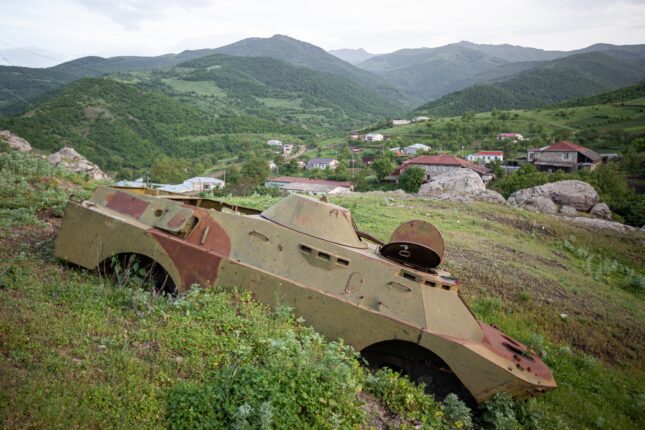-
Environmental NGOs as Tools of State Security Policy: A Growing Trend
August 26, 2024 By Peter Schwartzstein
For a group of self-described environmentalists, the roughly two dozen Azerbaijanis who suddenly assembled along the highway near the Armenian border in late 2022 looked like a pretty atypical lot. None of them appeared to have a background in any kind of green movement. Nor did any of them, clad in largely matching cold weather gear, attempt to explain how they could protest mining operations (their declared raison d’être) without encountering problems in a police state. Indeed, they remained unbothered even as their numbers swelled over the following weeks.
It just so happened, too, that they had hit upon a particularly strategic protest site at a particularly strategic moment. The road they had chosen to block was, by that time, the only way in and out of Nagorno-Karabakh, a territory then inhabited by a mostly self-governing population of ethnic Armenians, but which Baku also claimed and was in the process of trying to reconquer.
And that, as it turned out to no one’s surprise, was not a coincidence. By closing off that lone road, these “activists,”—most of whom turned out to be affiliated with regime-aligned institutions—were firing the first salvo in Azerbaijan’s latest bid to seize the parts of the Nagorno-Karabakh that it had not taken in 2020. Soon afterwards, they were replaced with uniformed troops. When, in late 2023, the Azerbaijani military completed its mission, many analysts agreed that the blockade that the protesters had initiated and which had fueled tremendous hunger and shortages of medical supplies across Nagorno-Karabakh had contributed to the ease of that victory.
Though extra brazen in how its protagonists went about their duties, this episode was just one of a growing number of instances in which authoritarian states have deployed environmental actors and rhetoric to their strategic benefit in recent years. Taking advantage of the profusion of genuine organizations in this space (and the expanding interest in environmentalism that underpins much of that surge), more regimes appear to see these organizations as useful cover to pursue political objectives. They have consequently displayed few inhibitions about rolling them out the world over.
Greenwashing to Strategic Ends
In Lebanon, Hezbollah, which controls swathes of the country and boasts a military stronger than that of the state, appears to have used an environmental NGO as a front for some of its intelligence-gathering operations along the Israeli border. The US Treasury Department imposed sanctions on that group (“Green Without Borders”) in August 2023, alleging that the organization’s posts are manned by militants and that its employees have prevented UN peacekeepers from accessing areas near the frontier. “The United States rejects Hezbollah’s cynical efforts to cloak its destabilizing terrorist activities with false environmentalism,” a senior Treasury official said as part of the department’s designation.
Just over the border, in Syria, the regime of Bashar al-Assad frequently cites environmental imperatives and the work of NGOs of dubious credentials and uncertain independence in pursuit of one of its core diplomatic goals––sanctions relief. These organizations are not necessarily wrong in identifying sanctions as an obstacle to domestic climate and environmental action, yet they are extremely careful to avoid mention of the Assads’ negligible historic interest in the environment, or, crucially, of the government’s own outsized contribution to the sorry state of the country’s landscape and natural resources. “Many of these NGOs are just tools. They will write what they are told because it is too dangerous to resist,” one exiled Syrian environmental journalist told me in a recent conversation.=
In Ukraine, where invading Russian forces have been trying to assert Moscow’s sovereignty over most of the Donbass region since 2014 and over other parts of the country’s south and east since 2022, the roll out of government-backed or supported NGO environmental initiatives appears to form part of its plan. The idea is that a more expansive Russian civil society presence can help strengthen wary locals’ allegiance to the Kremlin, while signaling, as with infrastructure linking occupied territories to Russia proper, the territorial coherence of all lands under Moscow’s control. Naturally, this means environmental civil society too.
Independent Moroccan and Turkish environmentalists suspect that their governments have been deploying NGOs in a similar sovereignty-cementing manner in the disputed Western Sahara region (in Morocco’s case), as well as in unsettled Kurdish-majority areas of southeastern Turkey. But, as in a number of other countries, they lack firm evidence. More provably, plenty of governments appear to be using protected area designations as a means of firming up unsettled or contentious borders.
Among innumerable recent instances of state-sponsored greenwashing, the Egyptian government used COP 27 in 2022 as an opportunity to bolster its reputation after years of negative headlines by accrediting dozens of domestic GONGOs (government-organized NGOs)—many of which had no record of past environmental work, and some of which, according to independent Egyptian environmentalists, were seemingly created for the occasion. These organizations at least could be relied upon not to protest against the government in Sharm el-Sheikh, while also delivering the (largely inaccurate) impression of a thriving environmental civil society.
This specific tactic can be applied in a conflict context, too. Having seized those disputed territories from the Armenians, the Azerbaijani state has rolled out a plan to turn them into a ‘Green Energy Zone,’ a means of burnishing its image and lackluster green credentials in the run up to its own COP in November 2024.
Conversely, in southeast Asia, China has energetically attacked independent organizations precisely because of the threat they pose to its own water and environment strategy. Having established the Mekong Dam Monitor in order to better inform downstream basin states of the volume of water than China is retaining behind its dams on that river, the Stimson Center and its partners have come under frequent assault from Beijing, which had benefitted from its previous monopoly on data. In one instance, Chinese officials purportedly even established a bogus Oregon-based environmental think tank as part of its bid to discredit the Monitor and the unhelpful (in its eyes) transparency it provides.
Dangerous Deceptions
As a means of pursuing policy on the cheap, exploiting environmental actors can undoubtedly be effective. The use of supposedly independent parties offers states a sort of deniability in contexts where the overt use of government personnel could be awkward or incriminating––or when states are intent on presenting certain initiatives as authentic expressions of the popular will, as opposed to directives from up on high. If nothing else, as in instances where it’s pretty transparent what’s going on, these tactics can catch adversaries off guard long enough for the orchestrators to put more concrete measures in place.
Furthermore, at a time when even the likes of the Taliban and Al-Shabab feel the need to assert their environmental bona fides, this faux environmentalism enables unpopular authorities––or even individual politicians––to better identify themselves with the hot topic de jour. From Central Asia to West Africa, conservationists question the seriousness of some wildlife-focused NGOs, a number of which are sponsored by local bigwigs seemingly intent on cultivating cuddlier images by identifying themselves with snow leopards, rhinos, and other nationally emblematic animals.
But for environmental causes writ large, all of this is an irretrievable negative activity. The deployment of ‘fake’ or state-orchestrated NGOs can damn all organizations by association, even if the vast majority of them are genuine. Indeed, Iraqi and other environmentalist colleagues say that legitimate organizations can struggle to counter the public’s impression that they’re government cutouts. For these independent NGOs, many of whom also already face considerable pressure precisely because security services assume that hostile entities are exploiting civil society in the same way as they exploit their ‘in-house’ organizations, this can be just another set of obstacles that they can ill-afford.
Vitally, the sapping of scarce “oxygen” from the environmental space for goals of limited or no actual environmental benefit can leave essential causes scrapping both for budget and attention. Similar to the relationship between online “clicktivism” and real world campaigning, faux environmentalism often does a very weak impression of the real thing.
Peter Schwartzstein is an environmental journalist and researcher who reports on water, food security, and particularly the conflict-climate nexus across some 30 countries in the Middle East, Africa, and occasionally further afield. He mostly writes for National Geographic, but his work has also appeared in the New York Times, BBC, Foreign Affairs, and many other outlets. He is a Global Fellow with the Wilson Center’s Environmental Change and Security Program, a TED fellow, and a fellow at the Center for Climate and Security. He also consults for various UN agencies and iNGOS. His first book, The Heat and the Fury: On the Frontlines of Climate Violence will be published by Island Press in September 2024.
Sources: AP News; The Atlantic; Bloknot; CivilNet; Henry L. Stimson Center; Ministry of Energy, Republic of Azerbaijan; Syrian Arab News Agency; US Department of the Treasury; Washington Post
Photo credit: The self-declared republic of Nagorno-Karabakh is the subject of an unresolved territorial dispute between Azerbaijan and Armenia, courtesy of Sebastian Castelier/Shutterstock.com.
 A Publication of the Stimson Center.
A Publication of the Stimson Center.






